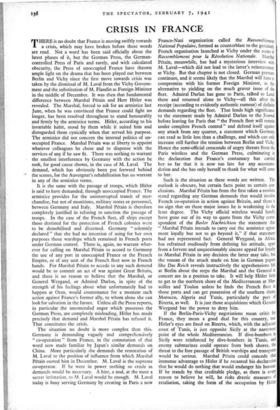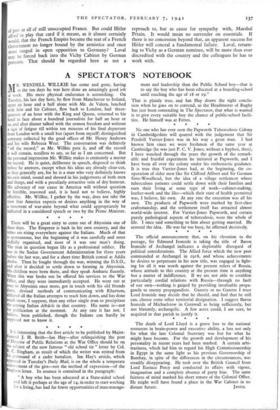CRISIS IN FRANCE
THERE is no doubt that France is moving swiftly towards a crisis, which may have broken before these words are read. Not a word has been said officially about the latest phases of it, but the German 'Press, the German- controlled Press of Paris and rarely, and with calculated obscurity, the Press of unoccupied France have thrown ample light on the drama that has been played out between Berlin and Vichy since the first move towards crisis was taken by the dismissal of M. Laval from the Vichy Govern- ment and the substitution of M. Flandin as Foreign Minister in the middle of December. It was then that fundamental difference between Marshal Petain and Herr Hitler was revealed. The Marshal, forced to ask for an armistice last June, when he was convinced that France could fight no longer, has been resolved throughout to stand honourably and firmly by the armistice terms. Hitler, according to his invariable habit, stood by them while it suited him and disregarded them cynically when that served his purpose. The armistice did not concern the internal politics of un- occupied France. Marshal Main was at liberty to appoint whatever colleagues he chose and to dispense with the services of any if he saw fit. There was nothing to warrant the smallest interference by Germany with the action he took, for good cause shown, in the case of M. Laval. The demand, which has obviously been put forward behind the scenes, for the Auvergnat's rehabilitation has no warrant in any of the armistice terms.
It is the same with the passage of troops, which Hitler is said to have demanded, through unoccupied France. The armistice provides for the uninterrupted transit of mer- chandise, but not of munitions, military stores or personnel, between Germany and Italy. Marshal Petain is therefore completely justified in refusing to sanction the passage of troops. In the case of the French fleet, all ships except those destined for the protection of French colonies were to be demobilised and disarmed. Germany " solemnly declared" that she had no intention of using for her own purposes those warships which remained in French ports under German control. There is, again, no warrant what- ever for calling on Marshal Petain to accord to Germany the use of any port in unoccupied France or the French Empire, or of any unit of the French fleet now in French hands. For Marshal Petain to accede to any such demand would be to commit an act of war against Great Britain, and there is no reason to believe that the Marshal, or General Weygand, or Admiral Darlan, in spite of the strength of his feelings about what unfortunately had to happen at Oran, would countenance for a moment such action against France's former ally, to whom alone she can look for salvation in the future. Unless all the Press reports, in particular the unconcealed anger which possesses the German Press, are completely misleading, Hitler has made precisely that demand and Marshal Petain has refused it. That constitutes the crisis.
The situation no doubt is more complex than this. Germany is demanding vaguely and comprehensively " co-operation " from France, in the connotation of that word now made familiar by Japan's similar demands on China. More particularly she demands the restoration of M. Laval to the position of influence from which Marshal Petain ousted him in December. M. Laval is the supreme co-operator. If he were in power nothing so crude as demands would be necessary. A hint, a nod, at the most a secret intimation. to M. Laval would be enough. M. Laval today is busy serving Germany by creating in Paris a new Franco-Nazi organisation called the Rassemblement National Populaire, formed as counterblast to the genuinely French organisation launched at Vichy under the name of Rassemblement pour la Revolution Nationale. Marshal Petain, meanwhile, has had a mysterious interview with M. Laval—which did not lead to the latter's reinstatement at Vichy. But that chapter is not closed. German pressure continues, and it seems likely that the Marshal will have te compromise with his former Foreign Minister, as the alternative to yielding on the much graver issue of the fleet. Admiral Darlan has gone to Paris, talked to Laval there and returned alone to Vichy—all this after the receipt (according to evidently authentic rumour) of definite demands regarding the fleet. That lends high significance to the statement made by Admiral Darlan to the Puma' before leaving for Paris that " the French fleet will remain under complete French control " and defend itself against any attack from any quarter, a statement which Germany can read as little less than a challenge, and which can only increase still further the tension between Berlin and Vichy. Hence the semi-official crescendo of angry threats from the Paris wireless and the German Press, culminating in the declaration that France's contumacy has carried her so far that it is now too late for any accommo- dation and she has only herself to thank for what will come to her.
Such is the situation as these words are written. The outlook is obscure, but certain facts point to certain con- clusions. Marshal Main has from the first taken a resolute stand regarding any German demands that would involve French co-operation in action against Britain, and there is no sign that on these major issues he is weakening in the least degree. The Vichy official wireless would hardly have gone out of its way to quote from the Vichy corre- spondent of the Basler Nachrichten the statement that " Marshal Main intends to carry out the armistice agree- ment loyally but not to go beyond it," if that statement had not represented fact. General Weygand, in Africa. has refrained studiously from defining his attitude, apart from a fervent and unquestionably sincere appeal for loyalty to Marshal Main in any decision the latter may take, but the venom of the attack made on him in German papers like Das Reich reveals instructively the apprehensions felt at Berlin about the steps the Marshal and the General in concert are in a position to take. It will help Hitler little to get to the northern shore of the Mediterranean at Mar- seilles and Toulon unless he finds the French fleet in those ports and can get possession of the southern shore. Morocco, Algeria and Tunis, particularly the port of Bizerta, as well. It is just those acquisitions which General Weygand has the power to deny him.
If the Berlin-Paris-Vichy negotiations mean crisis for France, they mean a good deal for this country, too• Hitler's eyes are fixed on Bizerta, which, with the adjacent coast of Tunis, is just opposite Sicily at the narrowest point of the whole Mediterranean. If dive-bombers in Sicily were reinforced by dive-bombers in Tunis, and enemy submarines could operate from both shores, the threat to the free passage of British warships and transports would be serious. Marshal Main could concede that immense advantage to Hitler if he recanted his declaration that he would do nothing that would endanger his honour• If he stands by that creditable pledge, as there is ever! reason to believe he will, he risks drastic measures of retaliation, taking the form of the occupation by Hitler
of part or all of still unoccupied France. But could Hitler afford to play that card if it meant, as it almost certainly would, that the French Empire became the seat of a French Government no longer bound by the armistice and once more ranged in open opposition. to Germany? Laval may be forced back into the Vichy Cabinet by German pressure. That should be regarded here as not a reproach to, but as cause for sympathy with, Marshal Petain. It would mean no surrender on essentials. If there is no concession beyond that, an apparent success for Hitler will conceal a fundamental failure. Laval, return- ing to Vichy as a German nominee, will be more than ever discredited with the country and the colleagues he has to work with.































 Previous page
Previous page